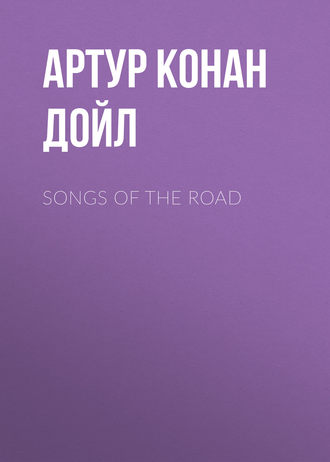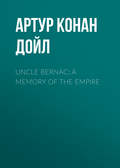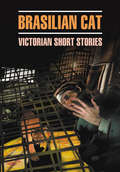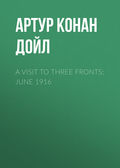полная версия

Артур Конан Дойл
Songs Of The Road
FOREWORD
If it were not for the hillocks
You'd think little of the hills;
The rivers would seem tiny
If it were not for the rills.
If you never saw the brushwood
You would under-rate the trees;
And so you see the purpose
Of such little rhymes as these.
Crowborough1911
I. – NARRATIVE VERSES AND SONGS
A HYMN OF EMPIRE
(Coronation Year, 1911)
God save England, blessed by Fate,
So old, yet ever young:
The acorn isle from which the great
Imperial oak has sprung!
And God guard Scotland's kindly soil,
The land of stream and glen,
The granite mother that has bred
A breed of granite men!
God save Wales, from Snowdon's vales
To Severn's silver strand!
For all the grace of that old race
Still haunts the Celtic land.
And, dear old Ireland, God save you,
And heal the wounds of old,
For every grief you ever knew
May joy come fifty-fold!
Set Thy guard over us,
May Thy shield cover us,
Enfold and uphold us
On land and on sea!
From the palm to the pine,
From the snow to the line,
Brothers together
And children of Thee.
Thy blessing, Lord, on Canada,
Young giant of the West,
Still upward lay her broadening way,
And may her feet be blessed!
And Africa, whose hero breeds
Are blending into one,
Grant that she tread the path which leads
To holy unison.
May God protect Australia,
Set in her Southern Sea!
Though far thou art, it cannot part
Thy brother folks from thee.
And you, the Land of Maori,
The island-sisters fair,
Ocean hemmed and lake be-gemmed,
God hold you in His care!
Set Thy guard over us,
May Thy shield cover us,
Enfold and uphold us
On land and on sea!
From the palm to the pine,
From the snow to the line,
Brothers together
And children of Thee.
God guard our Indian brothers,
The Children of the Sun,
Guide us and walk beside us,
Until Thy will be done.
To all be equal measure,
Whate'er his blood or birth,
Till we shall build as Thou hast willed
O'er all Thy fruitful Earth.
May we maintain the story
Of honest, fearless right!
Not ours, not ours the Glory!
What are we in Thy sight?
Thy servants, and no other,
Thy servants may we be,
To help our weaker brother,
As we crave for help from Thee!
Set Thy guard over us,
May Thy shield cover us,
Enfold and uphold us
On land and on sea!
From the palm to the pine,
From the snow to the line,
Brothers together
And children of Thee.
SIR NIGEL'S SONG
A sword! A sword! Ah, give me a sword!
For the world is all to win.
Though the way be hard and the door be barred,
The strong man enters in.
If Chance or Fate still hold the gate,
Give me the iron key,
And turret high, my plume shall fly,
Or you may weep for me!
A horse! A horse! Ah, give me a horse,
To bear me out afar,
Where blackest need and grimmest deed,
And sweetest perils are.
Hold thou my ways from glutted days,
Where poisoned leisure lies,
And point the path of tears and wrath
Which mounts to high emprise.
A heart! A heart! Ah, give me a heart,
To rise to circumstance!
Serene and high, and bold to try
The hazard of a chance.
With strength to wait, but fixed as fate,
To plan and dare and do;
The peer of all – and only thrall,
Sweet lady mine, to you!
THE ARAB STEED
I gave the 'orse 'is evenin' feed,
And bedded of 'im down,
And went to 'ear the sing-song
In the bar-room of the Crown,
And one young feller spoke a piece
As told a kind of tale,
About an Arab man wot 'ad
A certain 'orse for sale.
I 'ave no grudge against the man —
I never 'eard 'is name,
But if he was my closest pal
I'd say the very same,
For wot you do in other things
Is neither 'ere nor there,
But w'en it comes to 'orses
You must keep upon the square.
Now I'm tellin' you the story
Just as it was told last night,
And if I wrong this Arab man
Then 'e can set me right;
But s'posin' all these fac's are fac's,
Then I make bold to say
That I think it was not sportsmanlike
To act in sich a way.
For, as I understand the thing,
'E went to sell this steed —
Which is a name they give a 'orse
Of some outlandish breed – ,
And soon 'e found a customer,
A proper sportin' gent,
Who planked 'is money down at once
Without no argument.
Now when the deal was finished
And the money paid, you'd think
This Arab would 'ave asked the gent
At once to name 'is drink,
Or at least 'ave thanked 'im kindly,
An' wished 'im a good day,
And own as 'e'd been treated
In a very 'andsome way.
But instead o' this 'e started
A-talkin' to the steed,
And speakin' of its "braided mane"
An' of its "winged speed,"
And other sich expressions
With which I can't agree,
For a 'orse with wings an' braids an' things
Is not the 'orse for me.
The moment that 'e 'ad the cash —
Or wot 'e called the gold,
'E turned as nasty as could be:
Says 'e, "You're sold! You're sold!"
Them was 'is words; it's not for me
To settle wot he meant;
It may 'ave been the 'orse was sold,
It may 'ave been the gent.
I've not a word to say agin
His fondness for 'is 'orse,
But why should 'e insinivate
The gent would treat 'im worse?
An' why should 'e go talkin'
In that aggravatin' way,
As if the gent would gallop 'im
And wallop 'im all day?
It may 'ave been an' 'arness 'orse,
It may 'ave been an 'ack,
But a bargain is a bargain,
An' there ain't no goin' back;
For when you've picked the money up,
That finishes the deal,
And after that your mouth is shut,
Wotever you may feel.
Supposin' this 'ere Arab man
'Ad wanted to be free,
'E could 'ave done it businesslike,
The same as you or me;
A fiver might 'ave squared the gent,
An' then 'e could 'ave claimed
As 'e'd cleared 'imself quite 'andsome,
And no call to be ashamed.
But instead 'o that this Arab man
Went on from bad to worse,
An' took an' chucked the money
At the cove wot bought the 'orse;
'E'd 'ave learned 'im better manners,
If 'e'd waited there a bit,
But 'e scooted on 'is bloomin' steed
As 'ard as 'e could split.
Per'aps 'e sold 'im after,
Or per'aps 'e 'ires 'im out,
But I'd like to warm that Arab man
Wen next 'e comes about;
For wot 'e does in other things
Is neither 'ere nor there,
But w'en it comes to 'orses
We must keep 'im on the square.
A POST-IMPRESSIONIST
Peter Wilson, A.R.A.,
In his small atelier,
Studied Continental Schools,
Drew by Academic rules.
So he made his bid for fame,
But no golden answer came,
For the fashion of his day
Chanced to set the other way,
And decadent forms of Art
Drew the patrons of the mart.
Now this poor reward of merit
Rankled so in Peter's spirit,
It was more than he could bear;
So one night in mad despair
He took his canvas for the year
("Isle of Wight from Southsea Pier"),
And he hurled it from his sight,
Hurled it blindly to the night,
Saw it fall diminuendo
From the open lattice window,
Till it landed with a flop
On the dust-bin's ashen top,
Where, 'mid damp and rain and grime,
It remained till morning time.
Then when morning brought reflection,
He was shamed at his dejection,
And he thought with consternation
Of his poor, ill-used creation;
Down he rushed, and found it there
Lying all exposed and bare,
Mud-bespattered, spoiled, and botched,
Water sodden, fungus-blotched,
All the outlines blurred and wavy,
All the colours turned to gravy,
Fluids of a dappled hue,
Blues on red and reds on blue,
A pea-green mother with her daughter,
Crazy boats on crazy water
Steering out to who knows what,
An island or a lobster-pot?
Oh, the wretched man's despair!
Was it lost beyond repair?
Swift he bore it from below,
Hastened to the studio,
Where with anxious eyes he studied
If the ruin, blotched and muddied,
Could by any human skill
Be made a normal picture still.
Thus in most repentant mood
Unhappy Peter Wilson stood,
When, with pompous face, self-centred,
Willoughby the critic entered —
He of whom it has been said
He lives a century ahead —
And sees with his prophetic eye
The forms which Time will justify,
A fact which surely must abate
All longing to reincarnate.
"Ah, Wilson," said the famous man,
Turning himself the walls to scan,
"The same old style of thing I trace,
Workmanlike but commonplace.
Believe me, sir, the work that lives
Must furnish more than Nature gives.
'The light that never was,' you know,
That is your mark – but here, hullo!
What's this? What's this? Magnificent!
I've wronged you, Wilson! I repent!
A masterpiece! A perfect thing!
What atmosphere! What colouring!
Spanish Armada, is it not?
A view of Ryde, no matter what,
I pledge my critical renown
That this will be the talk of Town.
Where did you get those daring hues,
Those blues on reds, those reds on
blues?
That pea-green face, that gamboge sky?
You've far outcried the latest cry —
Out Monet-ed Monet. I have said
Our Art was sleeping, but not dead.
Long have we waited for the Star,
I watched the skies for it afar,
The hour has come – and here you are."
And that is how our artist friend
Found his struggles at an end,
And from his little Chelsea flat
Became the Park Lane plutocrat.
'Neath his sheltered garden wall
When the rain begins to fall,
And the stormy winds do blow,
You may see them in a row,
Red effects and lake and yellow
Getting nicely blurred and mellow.
With the subtle gauzy mist
Of the great Impressionist.
Ask him how he chanced to find
How to leave the French behind,
And he answers quick and smart,
"English climate's best for Art."






